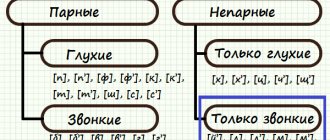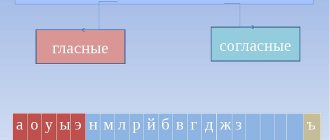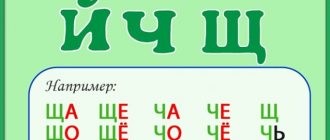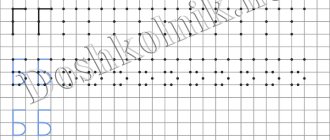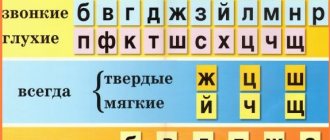Unpaired voiced consonants
In the Russian language, in addition to the paired consonants considered, there are unpaired voiced consonants, which are pronounced with more voice than noise. They are called the term "sonorous", which goes back to the Greek word sonorus, which means "sonorous". As is clear from their name, sonorant consonants, by their nature, do not have a voiced/voiced pair. This group of consonants consists of 9 sounds, designated in written speech by letters:
- the letter "th" is the sound [th']
- the letter “l” is the sounds [l] or [l']
- the letter "m" is [m] or [m']
- the letter "n" is [n] or [n']
- the letter "p" is [p] or [p'].
Sonorant sounds, except for [th'], form pairs with each other based on hardness/softness.
Let's observe:
- weasel [l] - lyre [l']
- milk [m] - broom [m']
- mink [n] - seal [n']
- lynx [r] - duckweed [r'].
They do not change their sound quality and do not depend on the phonetic position in the word. The remaining voiced consonants are influenced by voiceless consonants. Their quality varies depending on their location in the word. Let us consider these phonetic processes in more detail.
Unpaired voiced
Unpaired voiced consonants do not have dull-sounding analogues. They are also called sonorous because they sound more expressive:
- [th'] - yogurt [y'ogurt], terrible [terrible'], coyote [koy'at];
- [l] - sawdust [ap'ilk'i], basket [lukushka], lily of the valley [lily of the valley];
- [l'] - elegant [el'igan'tna], lazy [l'in't'ay'], drake [s'el'iz'in'];
- [m] - silently [silent'a], smart [smart'], unique [un'ikum];
- [m'] - dream [m'ich'tat'], minister [m'in'istr], treason [iz'ena];
- [n] - knockout [knockout], necessary [necessary'], flooring [nast'il];
- [n'] - nowhere [n'egd'e], shampoo [shampoo'], fire [agon'];
- [r] - romance [raman], joyful [radasny'], defeat [parazhen'ii'e];
- [r'] - glass [r'umka], river boat [r'ich'nik], margarine [margar'in].
You can easily remember all the voiced consonants using the phrase “The lion and the toad have many friends.”
Letter M style
The letter is very easy to write both in written and printed form.
If you print it, then just put two sticks and a tick between them - and you get the letter M.
Many good words begin with the letter M:
- mother is the closest person to everyone;
- Moscow is the capital of a country where people live whose native language is Russian;
- the baby is his mother’s very sweet little man;
- possible - a word that allows you to do pleasant things;
- ice cream is the most delicious treat for children and adults and many, many more wonderful words.
Stunning of voiced consonants
Voiced consonants, if they are at the end of a word, are in a weak phonetic position and are subject to deafening. When pronounced, they are replaced by their paired voiceless consonants:
- box [box]
- norov [noraf]
- threshold [steam]
- parade [parad]
- watchman [stohrash]
- frost [frost].
If a voiced consonant is located before a voiceless one, then similarly this is a weak phonetic position for it. The voiced consonant is affected by the voiceless consonant and becomes similar to it, that is, it changes its quality and sounds muffled. Assimilation of a voiced consonant occurs (Latin assimilatio - “likening”, “comparison”) on the basis of deafness/voice.
Let's observe:
- shelling [a p s t r' e l]
- pampering [bal a f s t v o]
- factory [za v a t s k o y']
- pointer
- tramp [b r a d ' a sh k a].
Consonant sounds do not form a phonetic syllable on their own, but only when paired with vowel sounds.
Paired voiced
There are 20 voiced sounds in the Russian language, and they are designated by 11 letters. In turn, they are divided into paired and unpaired. Paired voiced ones are:
- [b] - boot [bat'inak], beet [bur'ak], Pinocchio [burat'ina];
- [b'] - to love [l'ub'it'], thrifty [b'ir'izhl'ivy'], advertisement [ab'y'ivl'en'iy'e];
- [v] - driver [vad'it'il'], lie [vrat'], beer [p'iva];
- [v'] - wreath [v'inok], see [uv'id'it'], deja vu [d'izhav'u];
- [g] - race [race], deafening [audushyt'il'nyy'], warm [sagr'et'];
- [g'] - coat of arms [g'erp], garland [g'irl'an'da], hero [g'erai'];
- [d] - long [dl'in:y'], wait [padazdat'], soul [soul];
- [d'] - duchess [d'ushes], village [d'ir'evn'a], lonely [ad'inok'iy'];
- [z] - gold [zolata], St. John's wort [z'irobay'], belly [pusa];
- [z'] - strawberry [z'iml'in'ika], earth [oz'im'], winter [z'ima];
- [zh] - leather [leather'], acorn [zholut'], rozhon [razhon].
These consonants are called paired because there are dull sounds that sound similar to them - only with less voice and more noise. These are the sounds [p], [p'], [f], [f'], [k], [k'], [t], [t'], [s], [s'], [sh] . Try to pronounce the sound from the previous list and this list alternately and you will immediately understand what we are talking about.
How to explain to your child the difference between sounds.
Young children perceive any information well if it is presented in a playful way. For example, compose an interesting fairy tale for your baby (or better yet, together with your baby) that will help the child understand what the difference is between hard and soft sounds.
For example, something like:
Once upon a time there were vowels and consonants. They lived amicably and very cheerfully. But it so happened that the letters E, E, I, Yu, I wanted to gain power over other letters and sounds. The letters began to swear and quarrel among themselves. And this quarrel continued for a long time. The letters A, O, U, Y and E did not want to participate in this war; for a long time they did not choose sides and tried to maintain neutrality. Then the vowels decided to use one trick. They decided to ask for help from a soft sign that has no sound of its own at all. But he pits others against each other.
This letter told the main ones where the consonants were hidden, but asked for something in return. So the vowels found the consonants and surrounded them. And in order to avoid trouble, the consonant letters had to agree to everything that the vowels asked for.
So vowels received a lot of privileges. Now they can decide whether consonant sounds are soft or hard. And the soft sign received the same rights. He, too, can now command the defeated letters. However, not all consonants agreed to such rules. The hissing ones, for example, decided that they were now on their own and ran away into the forest. Now most consonants strictly follow the rules of vowels, but some still hide and live by their own laws.
This simple but interesting story will help explain the peculiarities of the relationship between vowels and consonants. But sibilant consonants are worth mentioning right away and, so to speak, adding them to the black list. You can even write “Wanted” at the top and list each letter at the bottom for your little one to remember. Let this hint always be before the eyes of the future student. For example, pin the list on the refrigerator or on his desk. The remaining consonants (those not in the list) now become either soft or hard if they are followed by the letters E, E, Yu, I, I and b. And if the consonants are followed by those that could not choose a side, namely A, O, U, Y and E or another consonant, then the consonant remains firm.
| Vowels | Consonants | ||||||||||||||||||
| A | ABOUT | U | Y | E | N | M | L | R | Y | B | IN | G | D | AND | Z | Kommersant | |||
| I | Yo | YU | AND | E | P | F | TO | T | Sh | WITH | X | C | H | SCH | b | ||||
Test "Letter M"
In order to develop phonemic awareness, it will be useful to listen to words containing M at the beginning, middle and end of the word. I prepared a small test for this case.
Ask your parents to read each word out loud to you and try to determine where M is pronounced firmly, where softly, and determine the place of the sound M in the word: beginning, middle, end.
Soft and hard voiced consonants
All voiced consonants differ in terms of softness/hardness, except for the always hard voiced consonant [zh] and the always soft (palatal) sound [th'].
The pronunciation of soft and hard consonants differs in the position of the tongue. When forming a soft consonant, the middle back of the tongue arches towards the speaker's palate.
The softness and hardness of voiced consonants depends on their phonetic position in the word. If after them there are vowels [a], [o], [u], [e], [s], then the consonants are pronounced firmly.
- bun [bu lka]
- gate [gate]
- hum [g u l]
- gift [d a r]
- z a r i [za r'a].
If after the consonants the letters “e”, “e”, “i”, “yu”, “ya”, “b” are written, then when pronouncing words, the voiced consonants sound soft:
- tag [b' and r k a]
- dove [g o l u b ']
- evening [v' e h' and r]
- hero [g' and r o y']
- woodpecker [d' a t' and l]
- winter [z' and m a]
The listed voiced consonants have paired voiceless consonants. Voiceless consonants form a pair with similar voiced consonants. Only in their education there is almost no voice, and noise predominates.
Continue the sentence
He slept all winter in a fur coat, sucked his brown paw, and when he woke up, he began to roar. This is a forest animal... (bear).
Look at the fellows: Cheerful and lively. Dragging from all ends Material for construction. One suddenly stumbled and a friend rushes to the rescue. The people here are good. Without work, for the life of me. Can’t live... (ant).
Lyudmila went to wash her hands. She needed... (soap).
Everyone here in the forest is talented - both a singer and... (musician).
Our Tanya is crying loudly. Dropped it into the river... (ball).
The distance of the fields turns green, the nightingale sings. The garden is dressed in white, The bees are the first to fly. Thunder rumbles. Guess what month this is? … (May.)
We put the puppy in water and soap for two hours with a washcloth... (washed).
Under a heavy burden - Underground, in a closet. She lives in a hole. Gray baby. Who is this? ... (mouse.)
In a black field, a white hare jumped, ran, and made loops. The trail behind him was also white. Who is this hare? … (chalk.)
![Pronounce (read) syllables with the sound [L_]](https://ls-kstovo.ru/wp-content/uploads/proiznosit-chitat-slogi-so-zvukom-l_-330x140.jpg)
